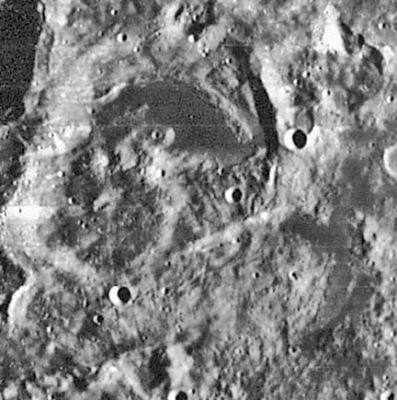Lacus Aestatis
Contents
Lacus Aestatis
(original IAU name: Mare Aestatis)
|
Lat: 14.83°S, Long: 68.57°W, Diam: 86.39 km, Depth: km, Rükl: 50 |

LOIV-168-h2 The IAU's Lacus Aestatis is the vertically elongated feature near the right margin of this photo. The horizontally elongated one above center seems to have been part of the original feature as drawn by Franz (Baum and Whitaker, 2007), but it seems now to be regarded (at least as far as nomenclature) as a separate feature on the floor of Rocca A (which more than fills the upper left quadrant of the frame). The crater Crüger, just out of the view to the SE, has an even more extensive dark floor. (note: the very dark feature in the extreme upper left corner is not a mare surface. It is the shadow cast by the east rim of Rocca)
Images
LPOD Photo Gallery Lunar Orbiter Images
Maps
(LAC zone 74D4) LAC map Geologic map
- IAU page: Lacus Aestatis
Description
Description: Wikipedia
Additional Information
- Small pyroclastic deposit (area = 370 km^2). Gaddis, L. (1999) Lunar Pyroclastic Volcanism Project.
Nomenclature
- The IAU name is Latin for "Lake of Summer", a modernized form of Mare Aestatis ("Summer Sea") one of a set of "four seasons" names given by Franz in his Die Randlandschaften des Mondes (1913) to previously unnamed dark patches in this area. The others were Mare Veris (Spring), Mare Autumni (Fall), and Mare Hiemis (Winter). The relevant section of Franz' map is reproduced as Figure 7 in Baum and Whitaker, 2007 (p. 132).
- In 1970 the IAU changed the name from "Mare" to "Lacus" (IAU Transactions XIVB, Menzel, 1971).
LPOD Articles
Bibliography
- Baum and Whitaker, 2007
- Coombs, CR & BR Hawke (1992) Pyroclastic deposits on the western limb of the Moon. Proc. Lunar Planet. Sci. 22, 303-312.
Named Features -- Prev: Aepinus -- Next: Sinus Aestuum